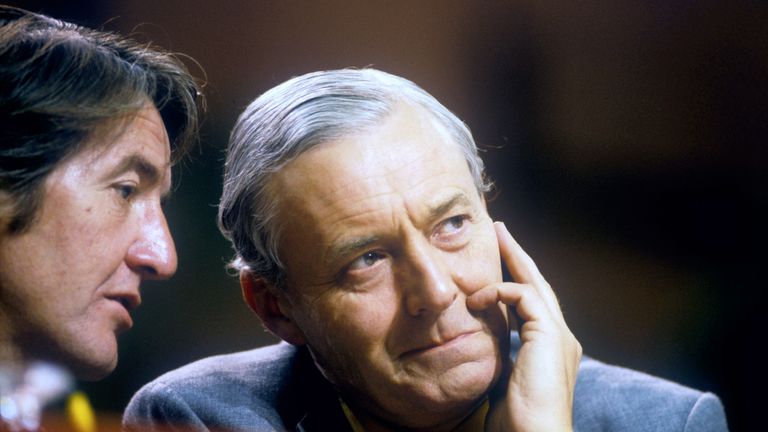It was, it was claimed at the time, the election that saved the Labour Party.
The brutal battle between Denis Healey and Tony Benn for Labour’s deputy leadership in 1981 is said to have shaped UK politics today.
Politics latest: Nandy to face MPs over Maccabi ban
Now, 44 years later, could the clash between Bridget Phillipson and Lucy Powell for the job save Sir Keir Starmer’s faltering premiership?
Or perhaps undermine the PM’s leadership and authority even more than they’re damaged already?
In 1981, former chancellor Denis Healey was the incumbent and the establishment candidate. Tony Benn, the darling of left-wing Labour activists, was the insurgent challenger.
‘Independent voice’
This time Ms Phillipson, the education secretary, is seen as Sir Keir’s candidate – almost certainly a disadvantage – while Ms Powell, sacked in last month’s cabinet reshuffle, has told Sky News she could “provide a stronger, more independent voice”.
The 1981 contest was the first fought under an “electoral college” giving 40% of votes to the unions, 30% to MPs and 30% to delegates from local parties. These days it’s one member, one vote.
Previously, the leader and deputy had been chosen by the party’s MPs. And in what was seen as a surprise at the time, Mr Healey had lost to the veteran left-winger Michael Foot in the poll of Labour MPs in the leadership election in 1980.
In 1981, in a mood of civil war in the party and after a campaign full of allegations of dirty tricks and ballot rigging by the unions, Mr Healey held off Mr Benn’s challenge for the deputy leadership by just 50.426% of the votes to 49.574%.
‘Popularity without power’
As the old bruiser with the most famous bushy eyebrows in politics later admitted: “I scraped in to victory by a hair of my eyebrow.” Mr Benn claimed it was a “staggering result” and his narrow defeat had given him “popularity without power”.
Given Ms Powell’s lead over Ms Phillipson in opinion polls, it will be a surprise if the 2025 result is as close as 1981. But the polls could, of course, be wrong.
There have been allegations of dirty tricks in the current contest as well. With just days to go before the winner is announced on Saturday, Ms Powell accused her opponent’s team of “throwing mud” and briefing against her.
Interviewed by Sky News political editor Beth Rigby for the Electoral Dysfunction podcast, Ms Powell attacked a “Labour source” who told the New Statesman: “Lucy was sacked from cabinet because she couldn’t be trusted not to brief or leak.”
Asked if her team had briefed against Ms Powell, Ms Phillipson told Beth: “Not to my knowledge.” But she said it would be “destabilising” if her opponent was elected, as she was no longer in the cabinet. There was “a risk of airing too much disagreement in public”, she claimed.
In a colourful and acerbic account of the 1981 contest in his autobiography, The Time Of My Life, Mr Healey began by noting wryly that Mr Benn announced his decision to fight him for the deputy leadership on April Fool’s Day.
“The next six months were the busiest and least agreeable of my life,” he wrote. “And it was all for the sake of a job which I found disagreeable and which in itself was not worth having.
“I felt, however, that it was essential to deny it to Tony Benn. If he had become deputy leader there would have been a haemorrhage of Labour defections to the SDP both in parliament and in the country. I do not believe the Labour Party could have recovered.”
‘Impossible for me to be heard’
The defections had already begun. Former Labour cabinet ministers Roy Jenkins, David Owen, Shirley Williams and Bill Rodgers had formed the “Gang of Four” and launched the SDP with a dozen more former Labour MPs.
Alleging dirty tricks during the 1981 campaign, Mr Healey claimed: “Wherever I went, a group of Militant Tendency supporters followed me round to heckle.
“In Cardiff, there was an orchestrated attempt to howl me down by extremist mobs of Trotskyites and anarchists, whom Tony Benn did nothing to discourage or condemn.
“In my rally in Birmingham, such groups were joined by a mass of IRA supporters who made it quite impossible for me to be heard.”
Mr Healey claimed dirty tricks against him continued right up to the day the electoral college met in Brighton’s famous conference centre on Sunday 27 September 1981.
After a third candidate, outsider John Silkin, was eliminated, the 1.25 million-strong Transport and General Workers Union (TGWU) – now part of Unite – switched to Mr Benn after saying it would abstain, following a decision by the union’s delegation on the floor of the conference.
👉 Click here to listen to Electoral Dysfunction on your podcast app 👈
“If even that one union’s delegation had voted as it know its members wanted it to vote, I would have had a majority of two and a half million,” Healey claimed in his autobiography.
But he went on: “My victory was a turning point.” He reported that one of his supporters, Labour MP Giles Radice, had written in his diary that evening: “Denis Healey has saved the Labour Party.”
But Mr Healey admitted the nature of the campaign and the “shameless ballot rigging by the trade unions” did the Labour Party enormous and lasting damage. The SDP “took off” and then the Falklands war helped the Tories recover and Margaret Thatcher won the 1983 general election.
“The scale of our defeat was devastating,” Healey wrote about the 1983 election. “That Tony Benn lost his seat in Bristol was small compensation.”
‘The most tremendous result’
But Mr Healey’s opponent, father of the current Northern Ireland Secretary Hilary Benn, saw it very differently in his account of the 1981 contest in his acclaimed diaries.
Mr Benn recorded in his diary that as he entered the conference hall at 5pm he was “prepared for a massive defeat”.
But later, recording himself for his diary at 1am in his hotel bathroom so as not to disturb his wife Caroline, he reflected: “Of course it has been an absolutely staggering result with all the media against us, with the most violent attacks by the shadow cabinet… we got to within 0.8% of victory.
“It was the best possible result because if I had won by 0.8% people would have shouted ‘cheat’, but Healey can’t shout cheat because he won … It is the most tremendous result.”
Mr Benn said Caroline told him: “‘You’ve got popularity without power, which is what you want’ … It was a shrewd comment… perhaps on me personally. But at the same time it was a terrific result.”
And Mr Benn’s campaign to drag the party to the left was only just beginning. The 1980s saw left-wing disciples including Jeremy Corbyn and Diane Abbott elected as MPs, followed in the 1990s by Corbyn ally John McDonnell, and later Mr Corbyn’s election as Labour leader in 2015.
Read more:
Why sacking Lucy Powell might come back to haunt Starmer
Unite accused of process ‘stitch up’ in deputy leadership nomination
But in 2025, no left-wing candidate made it on to the ballot for deputy leader. The nominations threshold of 80 MPs saw to that. Ms Powell has been called “soft left” and Ms Phillipson is one of Sir Keir’s most loyal cabinet allies and sometimes described as a Blairite.
Ms Philipson hasn’t been afraid, either, to suggest Ms Powell is a dangerous left-wing insurgent.
“Members might want to consider why a group that caused so much damage to the Labour Party over many years is backing my opponent,” Ms Phillipson said after the pro-Corbyn group Momentum endorsed her rival.
Left-wingers, however, claim this contest, triggered by Angela Rayner’s resignation, is an uninspiring choice, unlike 1981.
It is, however, the first time since 1981 that an election only for deputy leader has been held. Normally, the leader and deputy are elected at the same time.
In no way is Phillipson versus Powell a repeat of the 1981 civil war between the hard left and the old right, which did indeed shape Labour’s future. But some inside the party believe this election will do that as well and be just as significant.
Disclaimer : This story is auto aggregated by a computer programme and has not been created or edited by DOWNTHENEWS. Publisher: skynews.com










